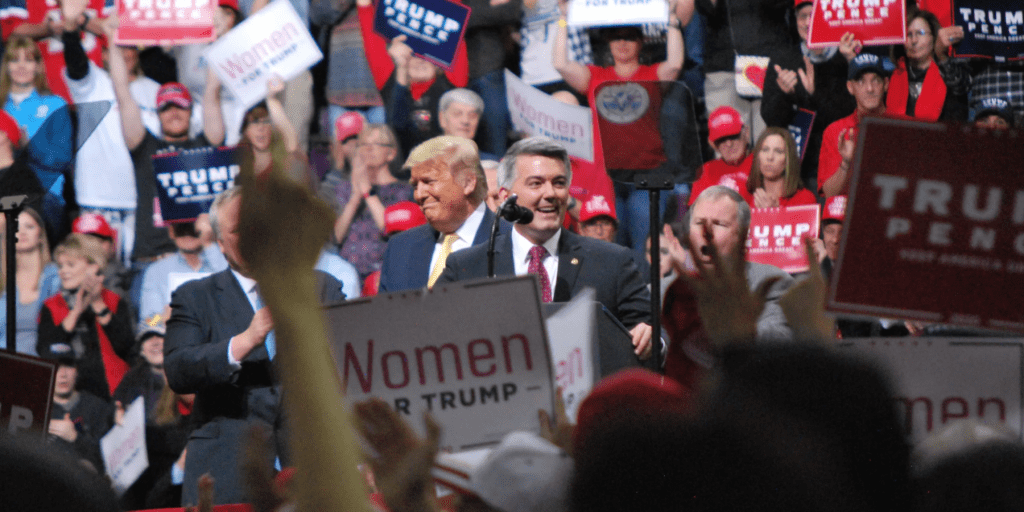Multiple Colorado Republicans in swing districts won’t say anything about what’s arguably the most important topic of the November election: Donald Trump.
State House candidate Caroline Cornell is one such Republican.
Asked by the Colorado Times Recorder if she supports Trump, Cornell hung up the phone after saying, “I’m—I don’t—I’m afraid I have to get on another call right now. I’ll have to call you back.”
Cornell, who’s challenging Democrat Tom Sullivan in a swing state House district in the Centennial area, didn’t return the call.
Republican Suzanne Staiert, who faces Democrat Chris Kolker in one of the most competitive state senate races of the year, didn’t want to talk about Trump either–even though her stance on him, like Cornell’s, could not be found in multiple database searches.
“What do you say when people ask you whether you support Trump,” I asked Staiert.
“I’ve never been asked,” she replied.
“Do you?” I asked.
“I’m not going to talk to you. I don’t consider you an actual newspaper,” she said, without saying if she thought it was a legitimate question.
It appears few reporters have asked state legislative candidates running in swing districts where they stand on Trump, but some who’ve posed the question haven’t had better luck getting an answer.
Richard Murray, who’s the Republican running in a race that could hand control of the CU Board of Regents to the Democrats for the first time in 40 years, wouldn’t talk to Colorado Politics reporter Ernest Luning about Trump.
“I don’t want to comment on the president,” Murray told Ernest Luning in January. “I see it as separate and distinct from the CU Board of Regents. The Board of Regents is charged with being the stewards of the flagship university in the state. It’ll be a race with its own issues and messaging, even though there’ll be a lot of noise in the news from other races on the ballot.”
Similarly, Denver Post reporter Nic Garcia reported last year that state Sen. Kevin Priola, who’s battling Democrat Paula Dickerson to retain a swing seat, doesn’t want to talk about Trump. Priola didn’t return a call from the Colorado Times Recorder.
The silence from Murray, Priola, and others likely reflects their belief that speaking ill of Trump could deflate or paralyze their Republican supporters. And speaking favorably of him could undermine their campaigns, due to the backlash from unaffiliated voters.
Polling data after the 2018 election showed any association with Trump helped poison Republicans across Colorado, mostly due to his unpopularity among unaffiliated voters, who outnumber both Democrats and Republicans in the state. There’s no indication that the public opinion in Colorado has become more favorable since then.
“Tell People Where You Stand.”
Former Republican candidate for governor, Victor Mitchell expressed serious dismay at Republican officeholders and candidates alike who don’t want to talk about Trump.
“I think it’s fundamentally wrong. As a public official, you should speak truth to power and tell people where you stand,” said Mitchell, who’s also a businessman and former state House member. “And let’s face it. Donald Trump is a despicable human being. He’s not a Republican. He’s not a conservative, never has been.”
Mitchell thinks some Republicans want to break with the president but are scared to do so because Trump has managed to “hijack the entire Republican Party.”
“But I’m an optimist,” Mitchell told the Colorado Times Recorder. “When Trump gets swept out of office in a matter of weeks from now, the Republicans will turn on him, and ultimately there will be some very good things that come out of this. You know, structural reforms to our whole democratic systems. That’s my hope, that things will evolve that way. As a lifelong Republican, it breaks my heart to see what’s happened to our party.”
Don’t Be “Ashamed” of Trump
Former state Rep. J. Paul Brown, who once won his southern Colorado seat by fewer than 200 votes, said fellow Republicans shouldn’t hide their support for Trump, if they indeed support him.
“I think that President Trump has done a lot of good for our country, and I don’t think he’s anything to be ashamed of,” said Brown.
But what about a close race in a district where Trump may be unpopular?
“I think we should support him. That’s just the truth, and I’d approach it with the truth.” said Brown, calling Trump “a whole lot better today than he was four years ago.”
“I Support Our President.”
Some Colorado Republicans running in close races aren’t scared to wave the Trump flag, as Brown advocates.

Cory Gardner, who’s running for what’s still considered a swing U.S. Senate seat in Colorado, has endorsed Trump, appeared with the president multiple times, and invited him to campaign with him in Colorado.
Gardner, who rarely criticizes Trump, argues that he can work with the president and that Colorado isn’t necessarily as blue as conventional wisdom holds.
“For those people who think that maybe nobody voted for President Trump, I’ll remind them that, you know, John McCain lost Colorado by nine points and Mitt Romney lost Colorado by six points and Donald Trump lost Colorado by over four points,” Gardner told KNUS’ Jimmy Sengenberger in February before appearing with the president in Colorado Springs. “That is hardly a state that is moving to the left when it comes to presidential elections.”
Bob Roth, a former Aurora city councilman who’s running for a swing state seat in Arapahoe County, is also openly supporting Trump.
“I support our president,” Roth told the Colorado Times Recorder. “I believe that the platform that he ran on is what he is delivering. And, you know, we were the best economy around, probably forever, until COVID hit. You know, that’s an unfortunate thing that happened–outside of any of our control. But I think Trump is doing the things he said he was going to do.”
Asked if he was being asked about Trump by constituents, Roth said he doesn’t “intentionally bring the topic up,” but if someone else does he’ll answer their questions.
COVID-19 is the number one topic on voters’ minds in his district, said Roth, as well as things the virus has affected, like schools, jobs, and the economy. “I think that Polis has overstepped, personally,” said Roth. “I think, people say, ‘Well, follow the science.’ I’m not a scientist, obviously, but I can certainly read the data and understand as well as I can as a layperson. But I am not in any way, shape, or form saying we should not take this seriously or that we should not have taken it seriously all along, but I think some of the measures were pretty draconian, and I just am really concerned about the number of businesses that will never reopen, the number of unemployed that we have right now.
“You know the whole broader conversation is, people might say, ‘Well, one life is worth it.’ And I don’t debate that, but there are more people killed in any number of ways every year than what COVID is doing. And if we are going–Look, we better stop drunk driving. We better stop the flu. And we better stop, you know. And so.”
Still, Roth says he believes people are “legitimately scared,” and he wants to concentrate on helping businesses that are struggling.
“I don’t think [Trump] going to affect my race one way or the other to be honest with you, but who knows?” said Roth.




